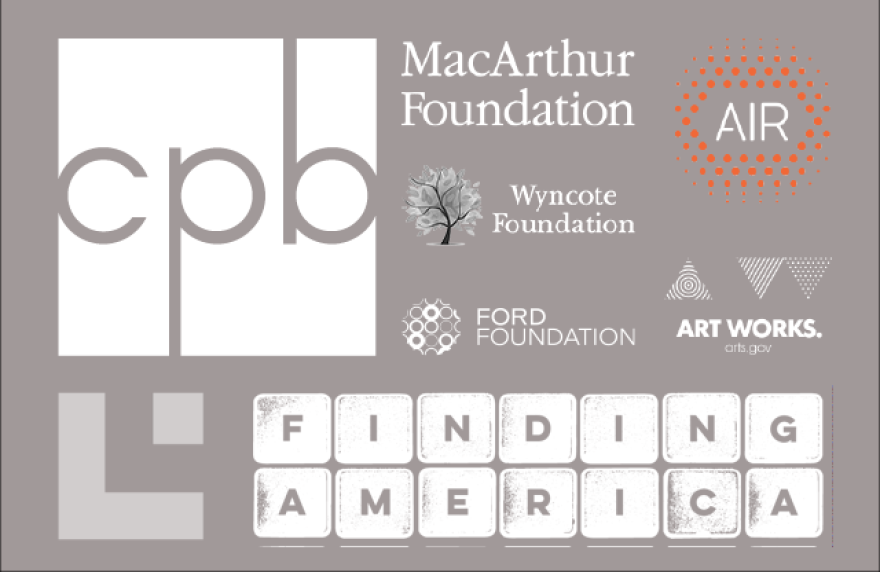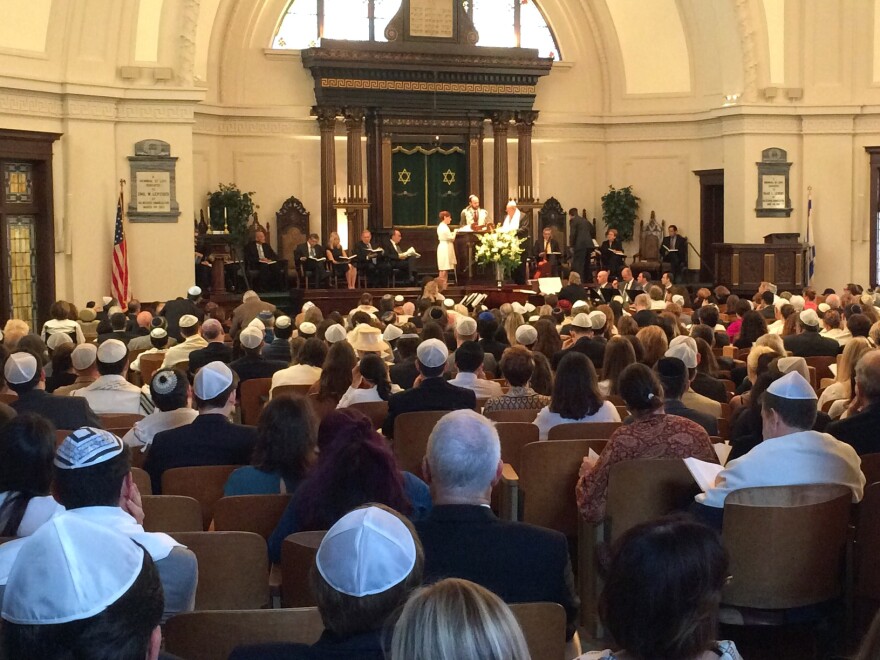We are all living with mass incarceration one way or another. It affects everyone, passively or actively.
I was recently sitting in the beautiful sanctuary of Touro Synagogue in Uptown New Orleans. It was Yom Kippur, and when I looked down at the holiday bulletin, there was a posting — about mass incarceration. It was an invitation to learn about the issue.
This is Unprisoned. I’m Eve Abrams.
“Sometimes people ask me if I like New Orleans,” says Rabbi Alexis Berk. She was a rabbi in Nashville before becoming head rabbi of Touro Synagogue. “People ask me, ‘Do you like New Orleans? Do you like it? Do you love New Orleans?’
“It’s a really hard question," she says. "It’s very hard to like a place that I consider has made certain, for generations, that many members of our society do not have their basic needs met. Segregated, incarcerated, marginalized — do I like that? Do I like to sit on my front porch, which is beautiful? Do I like that? Do I like my front porch? I really do; I love the balmy evening air. But —"
It’s not that simple. Getting used to some things can lead to complacency.
Touro Synagogue isn’t the only mostly white and middle class community of faith that’s involved helping formerly incarcerated people. But still, I took note of it.
One of the names at the bottom of the posting was Julie Silbert. She’s a congregant at Touro.

“We are studying and educating our congregational members about mass incarceration and associated issues because we felt that it was important to have more people in our — I’m going to call it "socioeconomic position" – become aware of these issues,” says Silbert.
One of the first things Touro’s mass incarceration initiative did was get in touch with Calvin Duncan. He came and spoke to Touro’s 7th and 8th graders.
“Yeah I think it’s this room, we met,” Duncan says as we walk through Touro. “And I explained to them the plight of people coming home from prison – that we didn’t have a place to live, we didn’t have clothes, we didn’t have food. To sum it up: what I took for granted for 28 and a half years in prison: food, clothing, shelter, a community... When I got out of prison, I didn’t have any of that.”
You might remember Calvin Duncan from the first Unprisoned story. He’s a big voice about the importance of voting for former prisoners returning home to their communities. Calvin was incarcerated in Angola for a crime he didn’t commit. When he told his story to the young people at Touro synagogue...
“They got it.” Duncan snaps his fingers. “Then they went and told their parents. And then the parents went and told the rabbi. Then the rabbi suggested that they start reading The New Jim Crow. And so the next thing I was asked to come speak to the grownups.”
Then the young people at Touro decided to have a fundraiser for the organization Duncan helped found, the First 72 Plus. It's a transitional house for men being released from prison, named for the most critical stage of reentry: the first 72 hours a person spends after release. Touro’s 7th and 8th graders organized an auction which raised $800 for the First 72 Plus. It was the start of an ongoing relationship. Now there’s a donation box at the congregation’s front door. There are clothing drives, and also a garden. Because the young people wanted to know:
“How do we get food? And so they suggested let us come and build you a garden at the First 72 Plus,” recalls Duncan. “And they built us a garden, and the guys still use that garden to plant vegetables.”
“This community – we really sit on this spot that is very visible,” says Teri Hunter, the board chair of social action of Touro Synagogue. The historic building is on St. Charles Avenue right near Napolean Avenue.
“You mean physical spot?” I ask.
“I mean physical spot. It’s a place of honor, and so it also comes, with that honor, comes responsibility, and it comes responsibility to the community.”
Teri Hunter says anyone’s first step toward action has to be awareness and understanding, bringing an issue to the forefront of a person’s consciousness. But it’s also crucial for people to appreciate their connection to the issue, even if it’s not immediately obvious.
"It is our responsibility, as Jews and as members of this community, to educate our community."
“It’s on our shoulders to make sure that we’re not just closing that door and saying, ‘Well, it’s not just us,” says Hunter. “And I think as Jews, you know we’ve lived that history: 'it’s not us.' And so if a society closes their back on one section, we’ve seen what happens. And so it is our responsibility, as Jews and as members of this community, to educate our community – at least our congregation – to the extent that we are able.”
“While our contemporaries and our peers might not have children or family members in the prison system, we are all affected by it,” says congregant Julie Silbert. “We are all impacted by it, in subtle ways and not-so-subtle ways.”
Silbert says living in New Orleans, with its high crime rate, means she and her family are directly impacted.
She feels even stronger about this since immersing herself in literature like The New Jim Crow by Michelle Alexander, which has lead her to conclude that mass incarceration engenders crime, making people less safe. Not everyone shares her perspective, but Federal officials who agree have already begun making changes.
“We all in this together, first of all,” says Calvin Duncan. “And some people — God has blessed some people with privilege. It’s a blessing that you have not been exposed to this. That you hadn’t been hauled in a police car or had to sell drugs to pay your rent and put food on your table. It’s a blessing that you hadn’t been forced to do that. But you are blessed to do something else.”
“If we don’t manifest our religious convictions through actual justice, righteousness, minimizing of a gap between what is and what could be and should be — if we’re not doing that actively, then what is the point of this grand building and enormous sanctuary?” asks Rabbi Berk.
Rabbi Berk has visited Angola with members of the First 72 Plus. It’s just one part of how she’s actively building relationships to strengthen ties between her religious community and a larger New Orleans community.
“I don’t pretend to know what if feels like to be raised as a black New Orleanian who’s facing a situation of potentially being incarcerated or having a brother, uncle, cousin, father who is," say Berk, "but I have a very curious heart, a very burdened spirit, and I know what we can offer. I don’t have a dream of saving anyone. I just feel like we got to do something together.”

Unprisoned: Stories From The System is produced by Eve Abrams and brought to you by New Orleans Public Radio and Finding America, a national initiative produced by AIR, the Association of Independents in Radio, Incorporated, and with financial support from the Corporation for Public Broadcasting, the Wyncote Foundation, the John D and Catherine T MacArthur Foundation, and the National Endowment for the Arts.
Subscribe to Unprisoned on iTunes for more stories about the effects of mass incarceration on our city, and find photographs, links to resources and more on our Facebook page.



